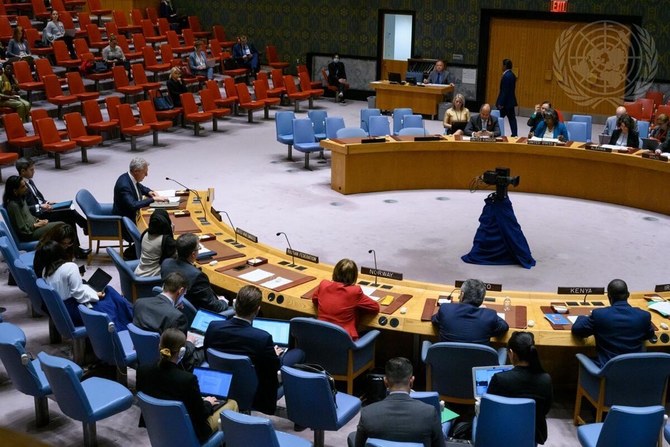NEW YORK CITY: The people of Iran are asking Western governments, and especially the US, to refrain from making any deals with the Iranian regime that might help to ensure its survival, the UN Security Council heard on Wednesday.
The government in Tehran will use any funds it receives from international agreements not to improve the welfare of its people but to buy more weapons and cause more destruction domestically and in the wider region, council members were warned.
Iranian lawyer Shirin Ebadi, a Nobel Peace Prize laureate, also urged “governments of the free world” to withdraw their ambassadors from Iran and reduce their level of diplomatic representation there to that of charges d’affaires.
She called on the UN to appoint a commission of inquiry, similar to the one set up by the organization in Myanmar, to investigate the Iranian regime’s most recent crimes and rights violations.
She was speaking at a Security Council meeting convened by Albania and the US, who said the objectives were to highlight the ongoing repression of women, girls and members of religious and ethnic minorities in Iran; the regime’s “unlawful use of force against protesters, (its) pursuit of human rights defenders abroad and its attempts to abduct or assassinate them;” and to identify ways to promote “credible, international, independent investigations into the Iranian government’s human rights violations and abuses.”
The wave of anti-government protests sweeping Iran was sparked by the death in police custody on Sept. 16 of Mahsa Amini, a 22-year old woman from Saqqez in Kurdistan Province, who was arrested three days previously for failing to follow strict rules on head coverings.
Since the latest demonstrations began, at least 300 protesters have been killed and more than 14,000 arrested during the regime’s brutal crackdown on the dissent. Human rights watchdogs describe the figures as conservative estimates.
Lawyers and journalists reportedly have been detained for supporting or reporting on the protests. Hundreds of those arrested are charged with offenses that potentially carry the death penalty. Meanwhile the government is blocking the internet in most of the country.
Independent experts at the UN have denounced the actions of the Iranian government as part of “a continuum of long-standing, pervasive, gender-based discrimination embedded in legislation, policies and societal structures” and expressed support for “the establishment of an international investigative mechanism to ensure accountability in Iran and to end the persistent impunity for grave human rights violations.”
Ebadi told the meeting on Wednesday that the efforts of the Iranian people to change the situation in the country and force reforms have constantly “hit a hard wall but now (Iranians) will not settle for anything but a democratic and secular government.”
Nazanin Boniadi, a Tehran-born British actress and activist, told council members that in 14 years of working with human rights campaigners she has never witnessed “such widespread and committed opposition to the Islamic Republic’s regime as there is in Iran today.”
She said: “While Iran has become accustomed to mass protests nearly once every decade, neither the student protests of 1999 nor the green movement of 2009, or even the most more recent November 2019 protests, compare in fervor or magnitude to the current protests, in which for the first time since the inception of the theocracy in 1979, people are not only openly opposing 83-year old Supreme Leader Ali Khamenei, which they started to do in 2017, but are actively fighting back to defend themselves against the security forces, and tearing down billboards and burning pictures of the founder of the Islamic Republic, Ayatollah Khomeini.
“Iranians, and the world, have repeatedly been hoodwinked to think that presidential elections, which have never been free or fair, would make a difference for them. But elections in Iran are a theater.
“The rise of the presidency of Ebrahim Raisi, who has been a pillar of the oppressive state and implicated in crimes against humanity, and whose leadership harks back to 1980s Iran, is proof enough that a culture of impunity reigns supreme in Iran.”
Boniadi said the future of Iran will be “written by its own people, on its own streets” but added that no country can stand alone in pursuit of freedom and self-determination. She therefore called on the Security Council to assist the people of the nation in their time of crisis “because the Islamic Republic isn’t just a threat to its own people; its human rights abuses have become one of its primary exports.”
She said: “The catalog of abuses by the regime in Iran and around the world is well documented.
“The Islamic Republic regime has taken foreign hostages to use as political bargaining chips and has intimidated, abducted and assassinated dozens of dissidents beyond its borders, including recent attempts on the lives of prominent writers and activists just miles away from where we’re currently gathered.”
She called for global unity as she expressed the belief that “the potential for the current protests to transform Iran from theocracy to representative government could be a geopolitical game changer” and “the single most important key to bringing about stability in the Middle East.”

























